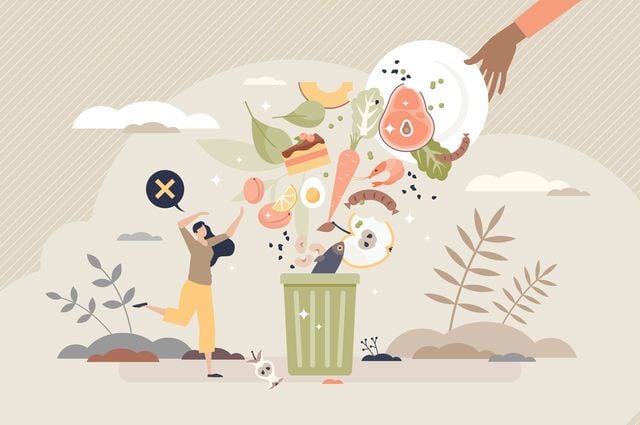Waste Not, Want Not: Food as a Major Sustainability Lever?
15 experts shared their view
Lever 1: Food waste
The recent Food Waste Index Report 2024 [1] highlights the chilling reality of global food waste with one billion meals going to waste daily (p.XVI) with the food service sector accountable for a staggering 28% (p.46). However, the report stresses the substantial data gaps in the quantification of the food waste in the food service sector and that "these unknown quantities could be substantial" (p. XVI). For hospitality businesses, food wasted results in paying for food that is not being converted into income and that needs to be disposed. Food waste is synonymous with 1) emissions (8-12% of total GHG), 2) usage of land (28% of the world's agricultural area for food being wasted) and 3) food insecurity (over 780 million people affected by hunger) [1] let alone issues around water usage and waste management. For hospitality operations, data seems to indicate a 7-to1 benefit-cost ratio in implementing a food waste reduction programme [2].
Lever 2: Dietary shifts
Food can enhance human health and environmental sustainability, or do the exact opposite and compromise both aspects [3,4]. The EAT-Lancet Planetary Health Diet [5] emphasizes the importance of whole grains, fruits, vegetables, nuts and legumes in contributing to the Great Food Transformation where meat and dairy are consumed in significant smaller quantities as "it is not a question of all or nothing, but rather small changes for a large and positive impact" [5, para 3].
So what now?
Together, eliminating food waste + transforming diets could work as major levers of socio-economic, climate and biodiversity improvements. Many people state that they want to lead a more sustainable lifestyle, [6] yet when it comes down to it, they do not make any substantial changes to their actions [7]. Many hospitality managers are well-intentioned but fail to implement meaningful changes at property-level.
With this in mind, there is two questions:
When it comes to reducing or eliminating food being wasted and transforming diets, what holds us back? ('us' in the sense of individual/managers/leaders)
References
[1] UNEP (March 27, 2024). Food Waste Index Report 2024. https://www.unep.org/resources/publication/food-waste-index-report-2024
[2] Champion 12.3 (April, 2018). The Business Case for Reducing Food Loss and Waste: Hotels. https://champions123.org/publication/business-case-reducing-food-loss-and-waste-hotels
[3] Ivanovich, C.C., Sun, T., Gordon, D.R. et al. Future warming from global food consumption. Nat. Clim. Chang. 13, 297-302 (2023). https://doi.org/10.1038/s41558-023-01605-8
[4] Humpenöder, F., Popp, A., Merfort, L., Luderer, G., Weindl, I., Bodirsky, B.L., Stevanovic, M., Klein, D., Rodrigues, R., Bauer, N., Dietrich, J. P., Lotze-Campen, H., & Rockström, J. (2024). Food matters: Dietary shifts increase the feasibility of 1.5°C pathways in line with the Paris Agreement. Science Advances, 10(13). DOI: 10.1126/sciadv.adj3
[5] EAT Forum (n.d.). EAT-Lancet Commission Brief for Food Service Professionals. https://eatforum.org/lancet-commission/food-service-professionals/
[6] OECD. (June 13, 2023). How Green is Household Behaviour? Sustainable Choices in a Time of Interlocking Crises. OECD Studies on Environmental Policy and Household Behaviour. https://www.oecd.org/environment/how-green-is-household-behaviour-2bbbb663-en.htm
[7] Kantar Public. (October 2021). Sharing the responsibility for climate action: An individual and collective commitment. In Our planet issue: Accelerating behaviour change for a sustainable future, Issue 4. https://kantar.turtl.co/story/public-journal-04/page/3
Since I started publishing about food waste management back in 2017, interest in the topic has exploded among experts, practitioners, and policymakers alike. It's become a hot topic, with everyone talking about how to cut down on waste and improve our diets. But even with all this buzz, many professionals in the hospitality and foodservice industry still don't see waste as their problem. Some argue,
Once the food's paid for, it's not my job if it goes to waste.Others may believe they're fulfilling their duty by simply recycling or composting waste, overlooking more comprehensive strategies for waste prevention and reduction. This disconnect highlights a critical barrier to progress in our industry—a reluctance to fully engage with the multifaceted challenge of food waste management. It has become evident to me that addressing these misconceptions and fostering a deeper understanding of the issue are essential steps towards effecting meaningful change. That means recognizing that it's everyone's responsibility to do their part, and it's about more than just tossing things in the recycling bin. It's time to roll up our sleeves and start making real changes:
- there's the issue of ingrained operational habits. Many managers may be accustomed to traditional methods of food procurement, handling and preparation, which might not prioritize waste reduction.
- implementing new practices requires a shift in mindset. Some staff might not be keen on changing things up.
- there's the challenge of consumer expectations. Changing menus or portion sizes to reduce waste may meet resistance from customers accustomed to certain offerings. Managers must balance sustainability goals with customer satisfaction to avoid negative impacts on business.
- cultural and economic factors play a role, including purchasing power, differentiation, and consumerism.
- finally, it's the issue of policy, production, consumption and trade. Is purchasing bananas in Europe or North America environmentally unsustainable, or does it contribute to supporting the livelihoods of hundreds of farmers in Central and South America? Does favoring local production promote opportunities for social advancement in less economically developed countries, or does it merely enrich powerful food moguls? Considering the carbon footprint of offering mass-consumed off-seasonal food versus seasonal premium options, such as Madagascar vanilla, Maine lobster, Chilean sea bass, Thai Kanyao durians or French champagne, is crucial in addressing this complex issue.
Transforming food offers is fundamental if we want to reach our ambitious and necessary net zero roadmap targets. We were involved in both challenges in our hotel projects: Reducing food wastes and changing menus and diets. When it comes to reducing food waste it is crucial to measure the waste at all relevant points (preparation, buffet offers, storage…) and compare it over time and with industry benchmarks in order to best involve all management levels. Here we saw good progress, when we do not blame each other but inspire to use resources (financially) conscious.
Changing diets and food offers is a bit more complicated but one of the best immediate levers to reduce climate emissions. Here our professional chef has realized in our projects that two things hold chefs back: time and know-how. That's why we work with chefs in day to day coaching and trainings to design and cook new food offers in their menus. By calculating emissions per single meal based on a professional database, we can evaluate each recipe and come up with better options. At the same time, we can inspire change regarding the choices of the customers through better educated kitchen and service teams.
There is no simple one size fits all ‘solution to this mammoth topic. Hotels cater to all types of demand and their food service offerings vary enormously depending on the type of property, the location, and the guests they cater to. By understanding the impact of our food choices, and by improving the training and education of our teams and our guests, we can help to make food part of the solution to climate and health crises, rather than a core contributor to the problem. This can be done while maintaining a healthy triple bottom line, but we will need the support of our business and government leaders, and a rebuilding of the human relationship with food that should come partially from a stronger emphasis on food education from a young age. Efforts to reduce waste on a localised level should be introduced alongside a more rigorous focus on the products we select so as to provide a market for the local producers with strong environmental and ethical credentials.
Related article by Adam Maclennan
Having worked with Chefs and F&B directors across the globe on both food waste and healthier food options, I would say that the main issues are training and having restaurant concept in line with holistic sustainability and wellness.
Today, there are solutions to measure and reduce food waste with technologies weighting and identifying when and what food is wasting. This data can then be used for menu engineering, optimising menus by reinforcing popular items, mastering ingredients selection and usage in meals preparation, as well as reducing food prep and fine-tuning orderings. The downside is that the set-up requires time and consistent usage to be efficient, but it can really be helpful in reducing food waste, and as a collateral benefit, food spendings.
Regarding healthier food options, education is also an issue, as well as defining what healthy food means for a particular restaurant or property, and how it fits in its overall wellness strategy. There are many dietary options and a lot of the time, staff doesn’t know the difference between them. Chefs themselves don’t have the nutritional background to cater for the various dietary requirements. Ingredients quality, freshness and processing is also an important factor on how food impacts health.
The concept of a restaurant and property becomes a key component to link the two topics, as it will impact where food is coming from, what kind of food is ordered, how in sink it is with the seasons and the local resources. Going for local, fresh, seasonal ingredients with procurement within a short mileage from the restaurant can lower food waste, make menu engineering more effective and increase food quality.
The reality is that the majority of professionals do not measure food waste. So not having the data is the first issue. The second issue is, once you have the data and understand the amount of waste you actually produce, how do you reduce it? Today, most Chefs are not equipped with the knowledge of how to repurpose waste. We've unconsciously decided that it is just the cost of doing business. In my opinion, there is a real need for knowledge.
The scientific data is overwhelming. A meal with beef is on average 7.26 kg of CO2 eq, chicken: 1.58 kg of CO2 eq, white fish: 1.98 kg of CO2 eq, and a plant based meal is 390g of Co2 eq. Eating more plant based meals reduces impact by at least 75%[1]. It is better for the environment and financially. Why does the industry not go all in? First, a lack of environmental impact knowledge, as most still believe transport is the main CO2 emitting culprit. Second: irrational fear. Fear of change, of letting go of our traditions, of losing customer base. Again, knowledge is key here.
One of the biggest challenges we face is the very idea of hospitality. There is still a (strong) perception that to be hospitable means to be generous. That by giving more we are adding value, delivering a better experience, serving better. Ofteb this is tied to cultural norms. When the reality is a lot of the food waste we generate comes from being overly generous. A shift to focus on quality over quantity and decoupling hospitality and abundance may lead us towards the start of a transformation. There's a lot more to achieve once this is done, but setting a strong foundation is important.
The hospitality industry is facing a number of challenges when it comes to sustainability and reaching Net Positive Hospitality. Food waste is one of those challenges. Here at the World Sustainable Hospitality Alliance, we have seen organisations showcase best practice in how they reduce emissions when it comes to food. For instance, the London Heathrow Marriott is a world leader with 100% of all its waste recycled so that nothing goes to landfill. We tried their banana skin burgers when we hosted our Autumn Summit last year at the hotel. The team there are truly inspiring.
So, what is stopping all hotels following suit? There won't be movement from the industry until there is collaboration and knowledge-sharing across the entire value chain. Rather than working in silo, the industry must come together to adopt best-practice and learn about the way hotels and suppliers of the industry can transform how they operate.
As a World Alliance, we facilitate this by bringing together organisations such as the World Resources Institute whose "Coolfood" initiative aims to curb diet-related emissions by 25% by 2030 in food service.
You can learn more about how the London Heathrow Marriott reduce food waste on our new podcast.
Intuition tells us that what holds us back is the combination of all three aspects: our individual decisions, managers, and leaders.
However, based on experience working with a restaurant chain in Brazil my short answer will be that organizations and their leaders are best positioned to lead a shifting course with the necessary speed if desired.
As part of Green Initiative climate certification, the restaurant chain introduced new management practices that influence their menu, their internal process, their food buying policy, the selection of energy sources, and their waste management process. The results after integrating circular economy practices, a profound rethinking of their menu, and other social policies related to their immediate community of workers, are as much as an 80% reduction in food waste in 2 years. This inspiring case was only possible because of the change of mindset within the leadership and, most importantly, the conviction and dedication of the management staff, who understood the relevance of shared value when it comes to every business, including their own. The case of Senac Restaurants in Bahia (Brazil), the organization behind the restaurant chain administration, provides clear evidence of how well-committed organizations can be part of the solution regarding reducing food waste in any sector or industry.
Reducing food waste and transforming diets is hindered by profit-driven food systems and cultural norms. International collaborative efforts are needed, such as government policies promoting and acknowledging sustainability efforts, and creating educational campaigns to empower consumers from an early age. As an example, VIRTU Resorts' innovative approach to technology includes the incorporation of biodegradable elements into landscaping and the installation of feeding stations for animals, both of which contribute to the promotion of biodiversity.
Additionally, offering smaller portions at resorts and restaurants can reduce overconsumption and waste. Community engagement, like partnering with local farmers, enhances sustainability. By addressing systemic barriers and implementing holistic solutions, we can create a more equitable and sustainable food system.
I think the barrier that's holiding all stakeholders back from making these - comparably easy but very effective - changes is stepping out of usual behavioural patters.
In our Futouris Sustainable Food project, we had a focus on food waste reduction and it was amazing to see the changes that were achieved just by making food waste visible to staff. Each hotel was able to reduce their food waste by 20-30 %, by analysing the food waste and visualisation methods like picture protocols of buffet leftovers. This "bringing to light" of the food that was going to waste really helped to ignite a mindshift.
Also, a holiday is a great opportunity to influence eating habits, as many travellers value trying new, local dishes and thus might be more open to stepping out of their usual behaviour patterns than at home. F&B Managers could use that by offering local seasonal dishes based on the Planetary Health Diet. We found out in a study that by using simple guest communication instruments, behavioural changes can be easily achieved, i.e. we used attractive signage to point guests to local products on the buffet - the consumption of these local products was increased by 135(!)%
The tragedy of the current sustainability crises facing the planet is that we cannot even manage to tackle the lowest hanging fruit: food waste. This issue is at the nexus of everything as humans cannot live without it and our waste of it is acerating climate change and taking food out of the mouths of the millions around the world who are starving. What is holding us back is culture, ignorance, lack of sufficient policy, and easy tools to tackle this wicked program. Industrialized cultures have treated food as a commodity, to be produced as cheaply as possible with hundreds of harmful inputs that destroy biodiversity, a short-sighted practice indeed. Indigenous cultures have often viewed food as sacred, rooted in land and cosmos, and readily able to go back to the earth in a circular economy. People waste food at home with no thought. Restaurants throw trillions of dollars globally away from wasted food, yet little is done to stop this methane spewing carnage from entering the waste stream. Municipalities struggle to come up with the infrastructure and processes to collect it, although our brethren across the pond in Europe seem to be figuring this out. We must act NOW.
From an operational standpoint, insufficient planning of menus, buffets, and kitchen organisation, compounded by a lack of allocated resources, serves as the primary driver of food waste in hospitality settings. The demanding nature of modern hospital operations further exacerbates this challenge due to constrained and unprepared labour forces compared to previous years. Companies often neglect to dedicate adequate resources to support effective waste reduction initiatives, prioritising immediate cost savings over the long-term benefits of sustainable practices1.
The pressure to achieve continuous growth exacerbates this issue, as businesses focus on maximizing profits and minimizing expenses, often disregarding the potential savings from reducing food waste. However, the role of governmental institutions is crucial. They typically do not enforce tax benefits or penalties for non-compliance with sustainable practices, contributing to operators' purposely constrained budgets and insufficient support for waste reduction strategies.
Addressing this issue is not solely the responsibility of hospitality professionals. Governments must also play a role by holding themselves and others accountable for inadequate resource allocation towards food waste control. The shared responsibility for addressing food waste is crucial for environmental preservation and sustainability.
1. Jackson, Tim. 2016. Prosperity without Growth. 2nd ed. London, England: Routledge.
Food waste in hospitality is a good example of the challenges facing sustainability. In food waste, like many other areas of sustainable hospitality, we know what needs to be done, but changing the behaviors – of individuals (consumers, in organizations) and businesses – is hard work.
Recognizing that we need not only engineers but behavioral and organization scientists will be a good first step.
Change, whether in businesses or individual behaviors, is hard. Too often, the argument is that if we educate people, they will "see the light" and change. But we only need to look at ourselves to know this isn't true. There are many things I know I should do more (join me in some exercise, anyone?) but don't. Some of these changes – like eating meat with dinner – are baked into long cultural traditions and personal identities.
There is no silver bullet – but a whole range of actions – from education to nudges, pro-social/ pro-environmental marketing to new technology adoption. We must bring all these tools – and more - to the table to effect the change we need.
And we need to remember change is not "one and done". Asking for personal behavior change takes long-term commitment to support and reinforcement.
Related article by Jonathon Day
Carnism is holding us back.
On my journey to investigate what influences our food choices since 2018, it soon struck me that our industry has a key role to play in driving change towards more sustainable diets. Indeed, we're shaping trends, defining what's desirable and offering inspiration.
If we want to live up to this major power and responsibility, we have to know our enemy well to strike where we know it will have a real impact.The name of this enemy? Carnism.
Carnism is the overarching ideology which gets most of us to consider that eating animals is natural, normal and necessary. Pr Melanie Joy is a best-selling author and public speaker who helps us grasp what is at stake with this ideology thus enabling us to recognize it and take appropriate measures, individually and collectively. Ignoring or underestimating carnism is definitely holding us back. On the otherhand, understanding it is an empowering step to making better decisions and taking appropriate actions. Discover more about carnism and Melanie Joy's books, Ted Talk and website to start raising the obstacles and accelerate your journey towards more plants and less wastes in your diet and your recipes.
Much of the litter […]is fairly directly caused by the massive secession or exclusion of most of our people from active participation in the food economy.- Wendell Berry, farmer and novelist, in "What Are People For?” p.127.Many express the desire to embrace a more sustainable way of life, yet actions typically don't mirror these assertions.
Reducing or eliminating food waste and transforming diets is not just about conscious choices but bridging the 'intention-action gap'. The concepts of the narrative self and experiencing self (see Daniel Kahneman), help to explain what is happening.
When it comes to food waste and diet, the narrative self might align with sustainability, desiring to reduce waste and embrace healthier diets for ethical and environmental reasons. However, the experiencing self deals with the daily reality of these aspirations. We may resist changes due to habitual preferences, comfort, convenience, and enjoyment associated with certain types of food or ways of eating.
This is where the concept of 'willingness to sacrifice' (Davis, Le, and Coy, 2011) comes in. Most individuals are accustomed to a certain lifestyle, with convenience and instant gratification often trumping sustainability. 'Sacrificing' these habits can cause discomfort, despite recognizing the value of sustainable living. It may be time to acknowledge the ‘Art of Discomfort’?
So what holds us back includes many factors and addressing those is key to bridge the gap between intent and action; this does not take away to importance of systemic changes that include policy support, corporate practices and education.















